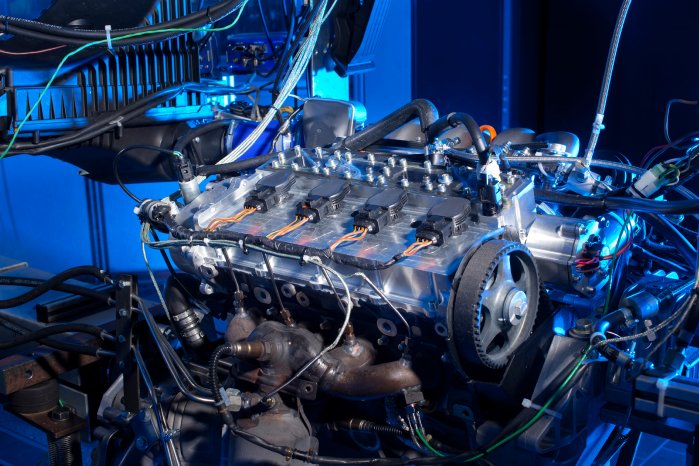"UniValve" is a mechanical system for the simultaneous and continuous adjustment of valve lift and opening event. The control shaft is driven by a wear-free, brushless electric motor. Dyno tests with a complete engine have already been conducted with an early group of customers and have demonstrated attractive potential for reducing fuel consumption and emissions with high operating reliability. "Fully variable valve control is one of the central key technologies for reducing automotive CO2 emissions and we are convinced that this technology will play an increasingly important role in both existing and future gasoline engines," says Dr. Gerd Kleinert, CEO of Kolbenschmidt Pierburg AG.
Continuous lift variation
In a gasoline engine with fully variable valve train the charge amount giving the engine output is no longer controlled by the throttle flap, but rather through the selection of valve timing and valve lift. Through early closure of the intake valve, both the gas exchange work and the (directly related) specific fuel consumption steadily decrease. In order to reap the advantages of very early closure, the opening event must therefore be as short as possible. For engines with conventional, i.e. non-variable valve trains, this represents a trade off to the maximum engine performance, calling for longer opening events and late intake closure.
By contrast, "UniValve" allows continuous variation of the valve opening event with a simultaneous, operationally specific adjustment of valve lift all the way down to zero lift. From a technical standpoint, the system on the one hand thereby reduces part load fuel consumption due to less pumping work, an optimized residual gas control and a high dilution capability of the combustion process, and on the other hand through the reduced power demand for valve activation.
Advantages on the intake and outlet side
When used on the intake side, UniValve can lower part load fuel consumption of conventional, naturally aspirated gasoline engines in combination with camphasing systems by up to 12%. At the same time, its high flexibility also allows an increase in low end torque and engine performance. A smaller engine can thus deliver the same driving performance and open up additional consumption advantages through this downsizing.
The exhaust side also considerably influences the gas exchange process and consumption to such an extent that at least cam phasers should be available. An engine with fixed exhaust valve timings cannot fully utilize the large potential of the UniValve that has been opened up on the intake side. It is therefore more advantageous when the UniValve system is also used on the exhaust side. This is especially true for the currently very popular, turbocharged four-cylinder gasoline engine. The trade-off between part load fuel consumption and high low end torque can be significantly mitigated. In a test involving a turbocharged 2.0 litre, four-cylinder gas engine, it was possible to reduce fuel consumption in a representative part load point by 9% compared to throttled operation with direct fuel injection. At the same time, torque was significantly increased at low end what is especially important for downsized engines.

